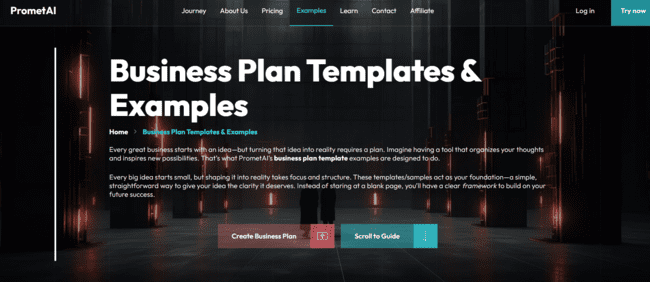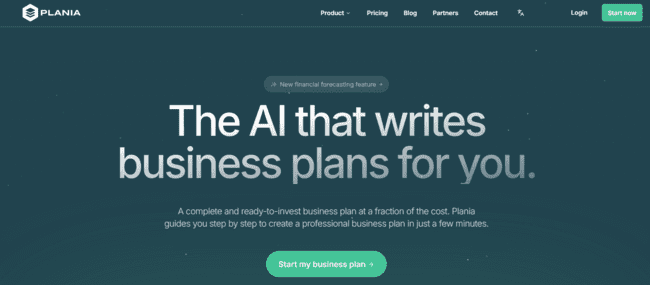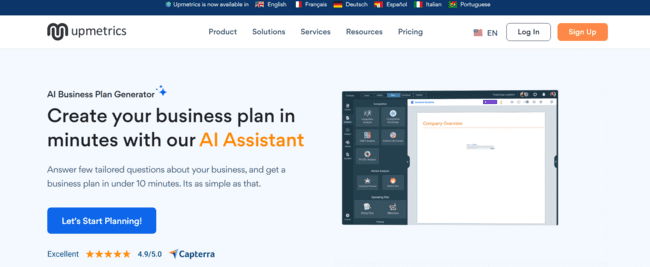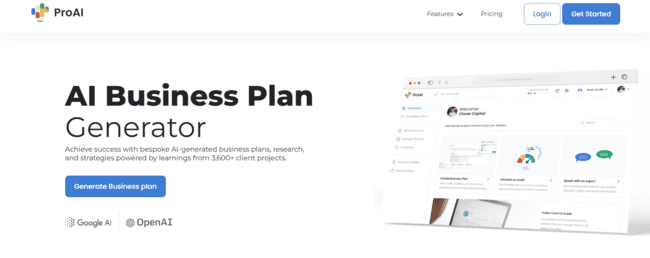6 AI Business Tools Transforming Strategic Planning
AI innovation in business is remarkable. Tasks requiring weeks of manual work are now handled by intelligent tools, ushering in a new era of AI superpowers. These platforms reshape strategy development for entrepreneurs, small teams, and enterprises.
At AI Business Magazine, we’re seeing the rise of agentic AI tools that don’t just assist, but actively plan, analyze, and execute. This month, we highlight six AI-powered business tools that help businesses operate more effectively. These tools go beyond idea generation; they create business plans, validate market hypotheses, execute financial models, and support sales outreach and investor preparedness.
Whether starting new ventures or optimizing existing operations, these tools provide actionable insights, demonstrable time savings, and a more competitive strategic position.
1. PrometAI: Instant Business Plans with Real-World Data
PrometAI is a standout in the AI business planning space. Its greatest strength is speed, generating investor-ready business plans in just minutes. But speed alone isn’t its only appeal. It blends data-rich insights with structured templates to generate complete, visually compelling business plans. Every section is grounded in up-to-date industry benchmarks, from executive summaries to financial forecasting. Users can tailor their plans with industry-specific scenarios and even explore risk through scenario analysis. PrometAI’s Strategy Toolkit and which includes SWOT, PESTEL, and Porter’s Five Forces adds depth for more nuanced planning. This tool saves countless hours for solo founders or teams with limited financial modeling experience and provides a roadmap grounded in
credible data.

2. Plania: Built for Fundraising and Investor Conviction
If you’re preparing to pitch, Plania is your AI business partner. Designed with investor-readiness in mind, it helps users build comprehensive business plans that articulate value, strategy, and financial viability.
Plania’s standout features include one-click generation of executive summaries and fully modeled financial projections. Its specialized AI, fine-tuned by experienced business writers, ensures that all sections are coherent and contextually aligned—unlike generic GPT-based templates.
Entrepreneurs can also review and revise content in real time using their iterative generate-review-apply model. Whether you’re raising pre-seed or Series A, Plania helps refine your narrative and positions your startup for funding success.

3. BizPlanner AI: Making Business Planning Effortless for Beginners
BizPlanner AI is an accessible, easy-to-use tool ideal for early-stage founders. Unlike other platforms that require deep input or prior planning knowledge, BizPlanner uses a simple guided questionnaire to turn ideas into full-fledged business plans.
Its intuitive interface makes it especially appealing to solopreneurs or first-time founders. The tool covers all the basics: marketing strategies, competitor analysis, and realistic financial projections. The plans can be downloaded in Word or PDF, making them easy to edit and share.
BizPlanner AI is also budget-friendly, often offering a one-time purchase instead of costly subscriptions, which appeals to small business owners who need impact without breaking the bank.

4. Upmetrics AI Tools: The All-in-One Planning & Forecasting Hub
Upmetrics is more than just a business plan generator—it’s a full-fledged planning and financial forecasting hub designed for entrepreneurs who need precision, clarity, and speed. It streamlines the journey from business concept to investor presentation with AI-powered tools that simplify complex planning tasks and make financial modeling far more accessible.
Upmetrics truly stands out in its AI-enhanced financial forecasting. Instead of relying on guesswork or generic templates, users receive intelligent suggestions for projections, with options to integrate accounting platforms for even more accuracy. This reduces errors and strengthens credibility, which is especially crucial when pitching to investors.
One of its most innovative features is the AI Co-Pilot, a conversational assistant that acts as a virtual mentor. It answers plan-related questions in real-time and offers guidance on business strategy, making it feel like it has an experienced advisor on call. Additionally, the platform includes a library of over 400 industry-specific templates, an AI-powered pitch deck generator, and collaborative tools to support planning across teams.

5. Pro AI: The Smartest Tool for Funding-Focused Founders
Pro AI is often integrated within larger platforms and is laser-focused on helping businesses secure capital. It uses proprietary data, third-party market research, and AI to create compelling business plans, pitch decks, and investor outreach strategies.
It doesn’t just generate plans; it goes deep. From detailed financial forecasts (P&L, balance sheets, cash flows) to investor matching and valuation support, Pro AI acts as a digital consultant. You can export Excel models, get suggestions for improving your pitch, and even simulate investor Q&As.
Pro AI benefits growth-stage startups looking to present data-driven, investor-attractive narratives without hiring an expensive advisory firm.

6. Frederick: AI-Driven Sales and Customer Insights
While Frederick isn’t a traditional business planning tool, it plays a critical role in validating the assumptions that go into one. It’s an AI-powered customer engagement platform that provides deep insights into how customers behave, what they respond to, and how sales teams can optimize outreach.
With features like automated lead nurturing, personalized messaging, and sales behavior tracking, Frederick helps businesses close more deals and retain customers more effectively.
Real-time customer intelligence is invaluable when crafting go-to-market plans, revenue models, and sales projections. In many ways, Frederick is the perfect companion to the other tools on this list. It ensures your assumptions are grounded in customer reality.







